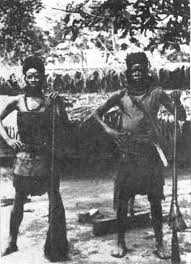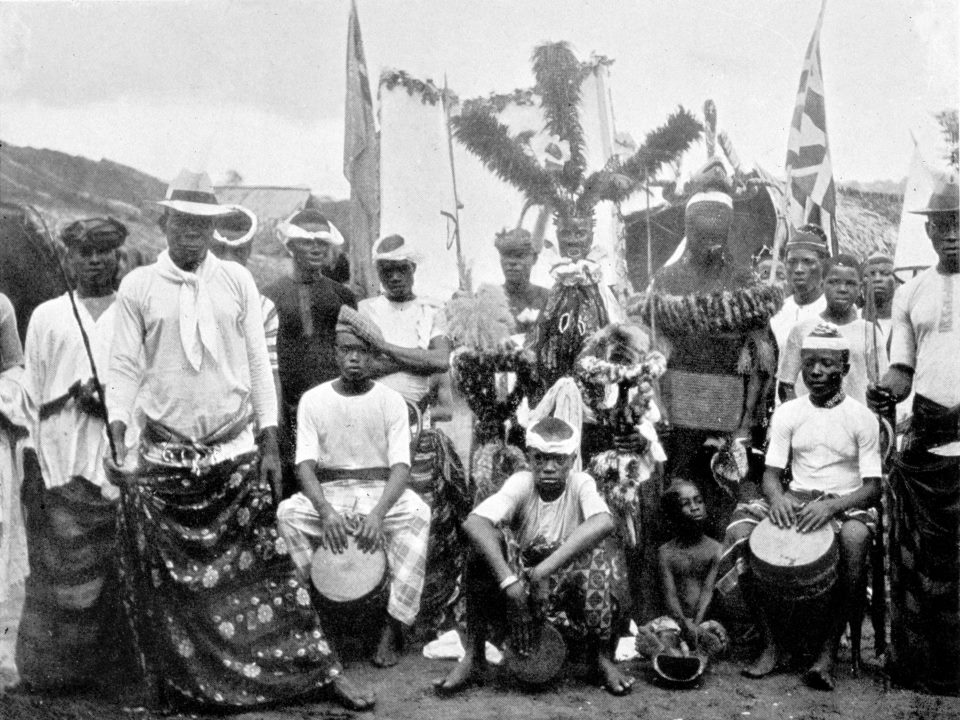Ikemefuna's Death
By Dash Liddi Brown
I remember the look on his face as I stepped onto the dirt road, a pot of palm wine resting gently upon my head, but a swarm of grief raging inside of me. He had been a brother to me, a brother I never had, and the thought of his eyes watching my turned back as I took one step after another away from him saddened me. I saw anguish engulf his body body until he stood motionless at the doorstep, as if his soul had left his body seeking a place of happiness. Nwoye had been my brother, he had let me enter the family, yet I was the one walking out on him. I was ashamed with myself, and even more ashamed of how I was making him feel. Three years is all they gave me, I did not want him to see what would happen next. The evening sun rested gently upon me as I walked, each step becoming heavier, each step making my heart sink deeper and deeper into my chest. Out of all the free will in life, fate had not been one of them. I was blessed to live but destined to die, and I knew my time was coming to a cease.
I began to think of the time I had spent with Nwoye, how his family had enjoyed my company, how he had looked up to me as a role model. I couldn’t believe that Okonkwo wasn’t my real father, although I had never been too fond of my real father. A faint smile began to form on my drooping face, one man nudged me to quicken my pace. I began to wonder how my mother would thank Okonkwo for looking after me, I imagined her warm smile and hazel eyes resting upon me and seeing what a man I have become, she would want to hear all about my experiences over the three years. A sudden thought emerged in my mind and my walking began to slow, I noticed my eyes drop to the ground as I began to think, “What if my mother isn’t alive?” The idea of my mother not being apart of my life brought back the sadness I had felt as I abandoned Nwoye. I remembered an old song I used to sing and walked to the beat of each word. I needed to land on my right foot for the last note of the song, then for sure my mother would be alive. The superstition left my mind, of course she is alive, I do not need a song to tell me whether God has decided to take my family or not. I did not plan to look back, for my mind was separate from my body and could not handle any more grief.
One of the men grunts at me and tells me to keep walking, a sudden feeling fluttered in my stomach and my legs began to melt. The sound of metal leaving a sheath filled my ears and a surging pain rose in my back. The pot of palm wine dropped to the floor in a million pieces. “My father, they have killed me!” I said, running towards Okonkwo. The man had attacked me and I knew I wasn’t going to make it. I begin running toward him, tears surging down my face. Then, something unexpected happens. My father, the one who had taken me into his family as his own, raises his machete, my body becomes limp, and everything turns black.





I began to think of the time I had spent with Nwoye, how his family had enjoyed my company, how he had looked up to me as a role model. I couldn’t believe that Okonkwo wasn’t my real father, although I had never been too fond of my real father. A faint smile began to form on my drooping face, one man nudged me to quicken my pace. I began to wonder how my mother would thank Okonkwo for looking after me, I imagined her warm smile and hazel eyes resting upon me and seeing what a man I have become, she would want to hear all about my experiences over the three years. A sudden thought emerged in my mind and my walking began to slow, I noticed my eyes drop to the ground as I began to think, “What if my mother isn’t alive?” The idea of my mother not being apart of my life brought back the sadness I had felt as I abandoned Nwoye. I remembered an old song I used to sing and walked to the beat of each word. I needed to land on my right foot for the last note of the song, then for sure my mother would be alive. The superstition left my mind, of course she is alive, I do not need a song to tell me whether God has decided to take my family or not. I did not plan to look back, for my mind was separate from my body and could not handle any more grief.
One of the men grunts at me and tells me to keep walking, a sudden feeling fluttered in my stomach and my legs began to melt. The sound of metal leaving a sheath filled my ears and a surging pain rose in my back. The pot of palm wine dropped to the floor in a million pieces. “My father, they have killed me!” I said, running towards Okonkwo. The man had attacked me and I knew I wasn’t going to make it. I begin running toward him, tears surging down my face. Then, something unexpected happens. My father, the one who had taken me into his family as his own, raises his machete, my body becomes limp, and everything turns black.
Bibliography:
- Pinterest, “Exploring Colonial Culture: Ancient Nigeria” <https://www.pinterest.com/pin/326370304224522910/> (16 October 2016)
- Wikipedia Encyclopedia, “History of Nigeria” <https://en.wikipedia.org/wiki/History_of_Nigeria> (16 October 2016)
- The Secret Museum of Mankind, “Hardworking Nigerians” <http://ian.macky.net/secretmuseum/page_1.34.html> (16 October 2016)
- Blogger.com, “Trip Down Memory Lane: Celebrating our African historical personalities,discoveries, achievements and eras as proud people with rich culture, traditions and enlightenment spanning many years” <http://kwekudee-tripdownmemorylane.blogspot.com/2013/06/ibibio-peoplethe-most-ancient-nigerian.html> (16 October 2016)
- Answers Africa, “50+ African Cities That Were Ruined By The Europeans” <http://answersafrica.com/50-african-cities-ruined-europeans.html> (16 October 2016)
This story incorporates a thorough narration of Ikemefuna’s thought process, allowing his perspective on the event to sound very realistic and as if it could have come right out of the book. The focus on Nwoye’s reaction is descriptive, intriguing, and thought-provoking -- “I saw anguish engulf [Nwoye’s] body until he stood motionless at the doorstep, as if his soul had left his body seeking a place of happiness.”
ReplyDeleteI liked how you built up the suspense leading up to Okonkwo's betrayal. By stating that Ikemefuna couldn’t believe that Okonkwo was not his real father, Okonkwo’s betrayal was even more heartbreaking and not expected.
ReplyDeleteWhile listening to this story, the revelation of Ikemefuma’s feelings towards his biological father struck me for their insight into the complexity of father-son dynamics, in which individuals reject their fathers in favor of opposite role models; essentially, the “grass is always greener on the other side” mentality. Ikemefuma had “never been too fold of [his] real father,” and took an immediate liking to Okonkwo: similarly, Okonkwo resented his father and strived to be his opposite, and Nwoye, Okonkwo’s biological son, feels alienated by Okonkwo and eventually leaves his tribe. In each of these relationships, Achebe demonstrates that the relationship between a father and soncan lead sons to try and distance themselves from their fathers, no matter who they are, when their fathers try to exert control over their actions.
ReplyDeleteWhile listening to this story, the revelation of Ikemefuma’s feelings towards his biological father struck me for their insight into the complexity of father-son dynamics, in which individuals reject their fathers in favor of opposite role models; essentially, the “grass is always greener on the other side” mentality. Ikemefuma had “never been too fold of [his] real father,” and took an immediate liking to Okonkwo: similarly, Okonkwo resented his father and strived to be his opposite, and Nwoye, Okonkwo’s biological son, feels alienated by Okonkwo and eventually leaves his tribe. In each of these relationships, Achebe demonstrates that the relationship between a father and soncan lead sons to try and distance themselves from their fathers, no matter who they are, when their fathers try to exert control over their actions.
ReplyDeleteI thought that the story was well crafted and written, with beautiful descriptive language and metaphors. I could feel the emotions of Ikemefuna in the writing, but one phrase confused me in the context of the narrative: Ikemefuna obviously did not know what was going to happen, so why did he say he was “blessed to live but destined to die?”
ReplyDeleteIt was interesting how you brought up differents ideas on Ikemefuna's feelings, specifically how he felt guilty for leaving Nowye and how the last thing on his mind was the fact that they were taking him to go kill him, until his last moment he believed Okonwko to be his “father”.
ReplyDelete“I was blessed to live but destined to die.”
ReplyDelete“I remembered an old song I used to sing and walked to the beat of each word.”
I think that one interesting aspect of Dash’s story is the fact that portrays Ikemefuna as someone who knows he is going to die. In the actual novel, this part of the story is a bit ambiguous because the reader doesn’t quite now if Ikemefuna knows of his imminent death. Dash filled in this gap, displaying Ikemefuna as slightly more aware and less oblivious about what was going to happen to him.
I was blessed to live but destined to die” this line stood out to me the most while Dash was reading. This idea that he was predetermined to die and that he accepted and was prepared for death intrigued me the most. He knew he was going to die, but he didn’t know that his own father would do it. That was the most powerful thought of betrayal and disappointment.
ReplyDeleteThis comment has been removed by the author.
ReplyDeleteThe story is beautifully written in a way that is very visual. Your descriptions of the photographs make them relate to the story very well. I enjoy the 4th pic the most because it embraces Ikemefuna as a role model, which would Okwonko never admit.
ReplyDeleteOne thing that I really enjoyed was his incorporation of folk tales and the song that would determine his mother's fate. I felt that it really made me believe that it was Ikemefuna talking and thinking.
ReplyDeleteI thought that Dash really conveyed ikemefuna’s point of view really well. Mixing in thoughts of how terrible he felt about leaving Nwoye. He also went in depth of how Ikemefuna felt of her mother after 3 years.
ReplyDelete